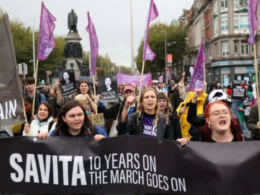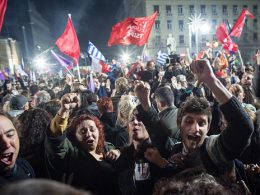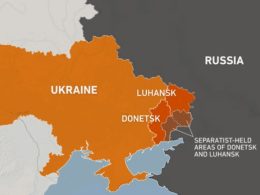The movement of May 15 in Spain has shaken the political elite to its core. Leaders and candidates of the main capitalist parties, PSOE and the PP are at a loss as to what to say. The media at first patronised the young people who occupied Puerta de Sol last week, labelling them the usual anti-capitalist suspects. Even as late as last Wednesday the Spanish press was in denial about the unfolding situation.
Matías Prats, a leading newsreader raised his eyebrows when he read out the headlines on the ’Spanish Revolution’ from the foreign press as if to say, ’what do they know?’
TVE had sent teams of reporters to Tunisia and Egypt to cover the Arab revolutions live yet they almost ignored the revolt taking place under their very noses. Only one station had live coverage from Madrid from May 15.
PSOE’s initial response was to hide behind the law and threaten repression egged on by the PP. The electoral commission and supreme court voted by a small majority to clear the squares. The close vote indicates that the Spanish state is not in agreement on what to do. The police unions told the interior minister, Rubalcaba, that clearing the squares was ’a bad idea.’ The police have been affected by the scale of the movement and also by the correct tactic of the demonstrators, who have fraternised with them, using YOUTUBE videos to make direct appeals to them to not intervene.
The movement has exposed the complete disconnection of the political elite from the realities of life. On the Friday before the elections when the movement made it to the top of the news it was striking to hear the difference between what the demonstrators are demanding and what the politicians are offering. Puerta del Sol is plastered with posters where people have written slogans and appeals for solidarity to the world: In English: ’PEOPLE OF EUROPE RISE UP!’ Almost spontaneously, commissions were formed and the manifesto of DEMOCRACIA REAL YA was democratically agreed. Below are some of the main demands:
“The priorities of any advanced society must be equality, progress, solidarity, freedom of culture, sustainability and development, welfare and people’s happiness.
These are inalienable truths that we should abide by in our society: the right to housing, employment, culture, health, education, political participation, free personal development, and consumer rights for a healthy and happy life.
The current status of our government and economic system does not take care of these rights, and in many ways is an obstacle to human progress.
Lust for power and its accumulation in only a few; create inequality, tension and injustice, which leads to violence, which we reject.
The obsolete and unnatural economic model fuels the social machinery in a growing spiral that consumes itself by enriching a few and sends into poverty the rest. Until the collapse.”
The news then went live to the leader of the PP, Rajoy, who was finishing a speech. As with Zapatero there was the obligatory patronising comment that it is good that young people are expressing their ideas and then to the ’politics’ as usual. Everything is PSOE’s fault and the Plazas must be cleared to protect the constitution and the day of reflection before the election. PSOE warn that things could be worse under a PP government. Rajoy and Zapatero use the same empty irrelevant phrases over and over again like two Ipods on repeat. As the youth so elegantly put it: ’¡PSOE Y PP, LA MISMA MIERDA ES!’ (PSOE AND PP. SAME SHIT!)
Thousands of small incidents underline the fact that the youth have managed to Darle vuelta a la tortilla.. (flip over the omelette) in only five days. On Radio Naciónal Española (RNE) last week a group of journalists were making fun of the young people in Puerta del Sol. Asking what they had to complain about when they could fly to London for 30 Euros. Back in their day life was really tough. A working mother phoned RNE and spoke coherently and powerfully for five minutes. She asked why RNE which is publicly funded was ignoring the demands of the young people. Why were they insulting the future leaders of the country? The ‘experts’ were speechless.
A feature of the movement has been the use of the internet to organise and offer an alternative to the PPSOE (PP and PSOE) controlled media. Following on from the Arab Revolutions it is clear that the internet speeds up events and acts as an independent organisational tool. It can also give the participants in the movement confidence that their movement is succeeding. An interesting aspect of the movement is that the TV and press became mere spectators. Always a few steps behind what is happening. The pronouncements of the government and supreme court are immediately ridiculed on TWITTER and Facebook and the call goes out for assemblies in the plazas and votes are taken and the decisions sent out via the Internet.
Despite the supreme court decision the interior minister Rubalcaba pulled back from the brink. The demonstrators voted to continue the occupations which have spread to over 150 Spanish cities and even internationally. Rubalcaba has one eye on the leadership of PSOE in the future and would not like to be the one responsible for attacking peaceful demonstrators on the eve of an election images of which would be beamed around the world.
The government back down exposes their weakness in the wake of a determined movement which in some ways is quite well organized. It is also clear that the winners of the local and provincial elections will have no legitimacy.
So, how has this situation come about? A situation where the young Spanish “democracy” is totally discredited in the eyes of probably a majority of society and definitely amongst most of the youth.
Puerta del Sol is the epicentre of the political earthquake but the tsunami has spread across the peninsula.
Spain has 4.9 million unemployed. 43% of young people cannot find a job. The TV constantly talked about the NI NI Generation who neither study or work. They were more interested in Big Brother and botellónes (drinking parties on the street) than politics. The crisis has had a devastating and shocking effect in Spain. Pensions have been reduced, services cut and most of all the feeling has spread that there is no future for this generation of young people. Banks have started repossessing homes as people cannot afford their mortgages. The anger at the system and especially the banks has been bubbling away under the surface for a long time.
There is also widespread contempt for and anger at the politicians of PPSOE for their corruption and lack of confidence in the electoral system. Elections are choreographed sterile affairs with a lot of slick advertising but little substance. In the Basque Country, the main parties have given up on promises and keep it simple with enormous billboards with photos of the candidates with meaningless slogans such as “PREPARED” or “READY”. It is politics without any actual politics and shows the contempt the politicians have for the people. The list system perpetuates the election of hacks who are in it only for themselves. Scores of candidates on PSOE lists have actually been charged with corruption or some sort of misdemeanor. When a politician is actually convicted of corruption they sometimes but not always resign. The problem is the same party just replaces them with another person further down the list. For that reason the movement is calling for clean and open lists and other democratic reforms.
The President of the Comunidad of Valencia is accused of accepting designer suits in return for political favours. In his last four years in power he has only deigned to do two press interviews.
So why did the movement develop now and in this way? The two main Spanish unions CCOO and UGT had organised a General Strike previously but it was a half-hearted affair, from their point of view. The leaders of the unions are generally seen to have been collaborating with the PSOE government. Socialists would generally expect from past experience that such a mass movement would first develop through the trade unions or at least in the factories and workplaces, but in this case it has not happened. It is clear that the young people have found a way round and over the road block set up by the leaders of the trade unions. Now it is important for the youth movement to link up with the workers in the factories and work places.
The movement seems to have taken an anti capitalist direction without a clear socialist consciousness amongst the Spanish people or indeed the existence of strong socialist parties. This shows us that the seeds of revolution and socialism exist in capitalism and that the experience of life under the rule of the banks pushes the mass of people into opposition to the system. People know what they are against and are now edging their way towards seeking an alternative.
Some of the most inspiring aspects of the movement have been the optimism of the youth, their ability to organise and indeed their hopes and dreams. Socialists are inspired by events in Spain.
The PP are declaring a massive victory over PSOE who they beat by 6% and are whipping themselves into a frenzy of triumphalism. On an election night as Rajoy saluted his party they chanted ‘¡BILDU FUERA!’ Bildu, in only a couple of weeks of legality, has become the second force in Basque politics. The attitude of the PP faithful does not augur well for the future and a victory for the PP in the general elections will surely heighten tensions around the national question.
The election results are a blurred photo of a moment in time and do not tell the whole story. 33% of the population did not vote. The PP got 24% of the votes of people who bothered to vote (1 in 4) while PSOE got 18%. IU had a slight increase in their vote but not as much as it could have been if they had taken a clear anti-capitalist position.
BILDU in the Basque Country are now the first force in Guipúzcoa, second in Vizcaya and third in Álava. They got the most votes in Donosti/San Sebastián. In Euskadi as a whole they will have 74 mayors and 953 councillors making them the most powerful force in local politics even above the Basque nationalist party PNV (Basque nationalist party). This is extremely significant as the coalition party was only legalised a couple of weeks ago. Their success in a way reflects the possibilities for genuine left wing parties. Although we would not characterise their programme as socialist they are perceived as a fighting party who will stand up for the workers in Euskadi. It is clear they received a fair few protest votes inspired by the May 15 movement as well as their traditional vote.
The election results are not going to make a fundamental difference to the situation in Spain. The May 15 movement has and will make the difference. The PP will continue on the same austerity road mapped out by PSOE but now politics has a new factor. Young people especially will stand in the way of further attacks. They are willing to struggle and have the confidence to fight back.
In Vitoria-Gasteiz last Saturday older workers spoke in front of the thousands in La Plaza. They invoked the spirit of March 3, 1976 (a City wide General Strike in response to the killing of workers by the police which was one of the key events of the “Transition” from Francoism). These workers spoke about a 35 hour week, the formation of committees in the workplaces to build for a general strike, internationalism and the need for socialism. They received thunderous applause which shows the potential for class and revolutionary socialist ideas. However there were also cat-calls from sections who dismissed them as union hacks and being part of the problem. This shows the confusion amongst some in the MAY 15 movement. In fact, the day after a banner appeared which urged people to get involved as people and not organisations and specifically mentioned unions and political groups. This is a weakness in the movement which socialists need to skillfully address.
However these weaknesses do not diminish the significance of this movement and what it has achieved in just a short time. May 15 has inspired young people and workers including internationally. Socialists should build international solidarity and follow the example of the Spanish youth rebellion.
Some slogans from the movement
Nietos en para, abuelos trabajando – Grandchildren on the dole. Grandparents working.
Esto no es botellón, es la revolución – This is not a piss up, it’s the revolution.
Roban los banco, no los inmigrantes – Rob the bank, not the immigrants.
Los políticos y banqueros desde arriba nos mean. (Los medios dicen que llueve) – Politicians and bankers piss on us from above. (The press say it’s raining)
Nos habéis quitado demasiado, ahora queremos todo. – They’ve taken too much from us. Now we want it all.
Juventud sin futuro: Sin casa. Sin curro. Sin pensión. Sin miedo. – Youth without a future: Without homes. Without work. Without pensions. Without fear.
Apaga la tele. Enciende tu mente. – Turn off the TV. Turn on your mind.
Spain is not a business. We are not slaves.











